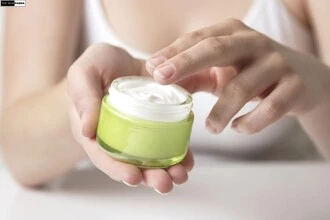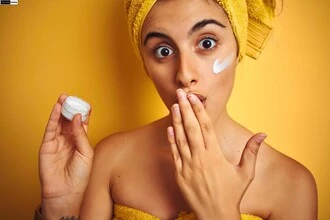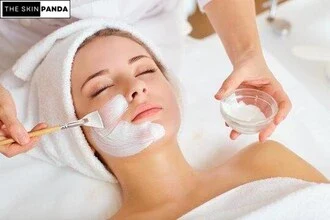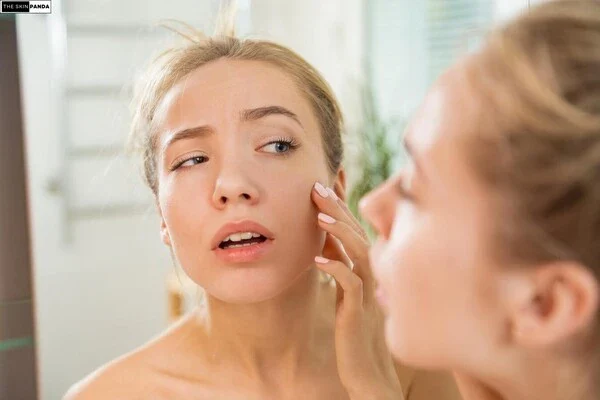Have you ever wondered why your skin remains dry despite your efforts to moisturize? This puzzling issue often has hidden culprits that might surprise you. Let’s uncover the reasons behind persistent dryness and explore effective strategies to reclaim that coveted radiant glow.
Dealing with dry skin can be a frustrating and perplexing experience, especially when you’re diligently applying moisturizers without seeing the expected results.
It’s a common scenario that many of us face, leaving us wondering: why is my skin so dry even when I moisturize? While moisturizers are meant to replenish and lock in moisture, the persistence of dry skin indicates that there might be underlying factors at play.
In this article, we’ll delve into the reasons behind this skin woe and explore practical solutions to help you achieve the hydrated, radiant skin you desire.
Understanding the intricate balance of your skin’s health and the impact of both external and internal factors is essential in unraveling this mystery and paving the way for a more informed skincare journey.
Let’s uncover the secrets to overcoming dryness and nurturing your skin back to its vibrant best.
Understanding Skin’s Natural Moisture Balance
To comprehend why your skin remains dry despite your best moisturizing efforts, it’s crucial to grasp the delicate equilibrium of your skin’s natural moisture balance.
Our skin is an intricate organ with multiple layers, each serving a unique purpose in maintaining its health and appearance.
The Skin’s Layers and Their Functions
Your skin, the body’s largest organ, consists of several distinct layers, each with its own set of functions crucial to maintaining overall health and well-being.
Understanding the roles of these layers provides insights into how your skin functions and how best to care for it.
Epidermis: The Outer Shield
The epidermis is the outermost layer of your skin and serves as a protective barrier against external elements. Its primary functions include:
1. Protection: The epidermis shields the body from harmful environmental factors, including UV radiation, pollutants, and pathogens.
2. Water Regulation: It prevents excessive water loss from the body, helping to maintain hydration.
3. New Skin Cell Formation: The lower part of the epidermis is responsible for generating new skin cells that eventually migrate to the surface, replacing older cells that slough off.
Dermis: Strength and Support
Beneath the epidermis lies the dermal layer, which plays a crucial role in providing structural integrity and support to the skin. Key functions of the dermis include:
1. Collagen and Elastin Production: The dermis contains collagen and elastin fibers that maintain the skin’s firmness, elasticity, and youthful appearance.
2. Blood Supply: Blood vessels within the dermis nourish the skin cells with essential nutrients and oxygen.
3. Nerve Endings: Nerve endings in the dermis provide sensation and transmit signals related to touch, temperature, and pain.
4. Hair Follicles and Sweat Glands: Hair follicles and sweat glands originate in the dermis, contributing to the regulation of body temperature and waste elimination.
Subcutaneous Tissue: Cushioning and Insulation
The subcutaneous tissue, situated beneath the dermis, serves as a cushioning layer and plays a role in temperature regulation. Its functions include:
1. Insulation: Fat cells in the subcutaneous tissue provide insulation, helping to regulate body temperature and maintain warmth.
2. Shock Absorption: This layer acts as a cushion, protecting internal organs and underlying structures from impact.
3. Energy Storage: Fat stored in the subcutaneous tissue serves as an energy reservoir that the body can draw upon when needed.
Understanding the functions of these skin layers highlights the intricate balance that keeps your skin healthy, resilient, and well-hydrated.
Each layer contributes to the overall health and appearance of your skin, emphasizing the importance of holistic skincare practices.
The Skin’s Natural Moisture Barrier

At the heart of your skin’s health lies the natural moisture barrier, a remarkable defense mechanism that safeguards against moisture loss and external aggressors.
This barrier, found in the outermost layer of the skin called the epidermis, is instrumental in maintaining optimal hydration and overall skin function.
Composition and Structure
1. Lipids and Natural Oils: The moisture barrier is composed of a complex mixture of lipids, including ceramides, fatty acids, and cholesterol. These lipids form a protective barrier that prevents water from escaping and shields the skin from environmental stressors.
2. Bricks and Mortar Analogy: Imagine the skin cells as bricks and the lipid mixture as mortar. Just as mortar holds bricks together, these lipids bind skin cells, creating a strong and effective barrier.
Functions of the Moisture Barrier
1. Preventing Moisture Loss: The primary function of the moisture barrier is to prevent water from evaporating out of the skin. This helps maintain the skin’s hydration and suppleness.
2. Shielding Against Irritants: The barrier acts as a shield against external irritants, pollutants, and pathogens that could potentially damage the skin.
3. Regulation of pH Balance: The moisture barrier helps maintain the skin’s pH level, which is crucial for a healthy and functional skin barrier.
Factors that Disrupt the Barrier
1. Harsh Cleansers: Using harsh cleansers can strip away the natural oils and disrupt the moisture barrier, leading to increased water loss.
2. Environmental Factors: Exposure to extreme weather conditions, such as cold, dry air, or excessive heat, can compromise the barrier’s integrity.
3. Over-Exfoliation: Excessive exfoliation can remove the outermost layer of skin cells, weakening the barrier’s protective function.
Maintaining and Restoring the Barrier
1. Hydrating Ingredients: Moisturizers containing humectants (e.g., hyaluronic acid) attract moisture to the skin’s surface, bolstering the barrier’s effectiveness.
2. Emollients and Occlusive: Products with emollients (e.g., natural oils) and occlusive (e.g., petroleum jelly) create a protective seal, reducing water loss.
Common Causes of Persistent Dry Skin

Dry skin can be a persistent issue, even when you’re regularly moisturizing. The reasons behind this phenomenon often span both external and internal factors.
Knowing these potential causes can empower you to make targeted changes in your skincare routine and lifestyle. Let’s delve into these common culprits:
External Factors
1. Harsh Weather Conditions: Extreme weather, particularly cold and dry climates, can strip your skin of its natural oils, leading to dryness. Additionally, exposure to strong winds can exacerbate moisture loss.
2. Environmental Pollutants and Toxins: Pollutants in the air can disrupt your skin’s protective barrier, allowing moisture to escape more easily. These pollutants can also cause oxidative stress, contributing to dryness.
3. Incorrect Skincare Routine: Over-exfoliating, using abrasive cleansers, or incorporating harsh products can disrupt the natural moisture barrier, leaving your skin more vulnerable to dryness.
Internal Factors
Dehydration and Inadequate Water Intake: Hydration starts from within. If you’re not consuming enough water, your skin can become dehydrated, making it harder for moisturizers to work effectively.
1. Poor Diet: A diet lacking essential nutrients, especially omega-3 fatty acids, can impact your skin’s ability to maintain moisture. Omega-3s play a role in preserving the skin’s lipid barrier.
2. Underlying Medical Conditions: Skin conditions like eczema and psoriasis can compromise the skin’s barrier function, leading to dryness. Additionally, issues like thyroid dysfunction can influence skin health.
3. Aging and Decreased Oil Production: As we age, our skin produces fewer natural oils, which help trap moisture. This reduction in oil production can contribute to dry skin.
The Role of Moisturizers on the Skin

Moisturizers are key players in your skincare arsenal, especially when dealing with persistent dry skin.
These products are designed to help replenish and lock in moisture, aiding your skin’s natural barrier in its fight against dryness.
Let’s delve into the important roles moisturizers play in your quest for well-hydrated skin:
Types of Moisturizers
1. Humectants: These ingredients, like hyaluronic acid and glycerin, attract water from the environment and deeper layers of the skin, helping to maintain hydration on the surface.
2. Emollients: Emollients like shea butter and oils create a protective layer on the skin’s surface, sealing in moisture and preventing water loss.
3. Occlusives: Occlusive agents, such as petroleum jelly and beeswax, form a barrier that reduces water evaporation, enhancing the effectiveness of other moisturizing ingredients.
How Moisturizers Work to Retain Skin’s Natural Moisture
Moisturizers are your skin’s allies in the battle against dryness, playing a crucial role in maintaining hydration and promoting a healthy complexion.
These products work in intricate ways to reinforce your skin’s natural moisture retention mechanisms and keep your skin supple and radiant.
Below are different ways moisturizers work to retain skin’s natural moisture:
1. Replenishing Lost Moisture:
Humectants: Moisturizers often contain humectant ingredients like hyaluronic acid and glycerin. These substances draw moisture from the environment and deeper layers of your skin, binding it to the surface and increasing hydration.
2. Creating a Protective Barrier:
Emollients: Emollient-rich moisturizers, such as those containing natural oils, create a protective barrier on the skin’s surface. This barrier locks in existing moisture, prevents water loss, and provides a smooth texture.
3. Reducing Water Evaporation:
Occlusives: Ingredients like petrolatum, beeswax, and shea butter act as occlusives, forming a seal over the skin’s surface. This seal minimizes water evaporation and enhances the effectiveness of other moisturizing ingredients.
4. Enhancing Skin’s Natural Functions
Strengthening the Moisture Barrier: Moisturizers bolster the skin’s natural moisture barrier by replenishing lipids and supporting the skin’s ability to retain water.
Facilitating Repair and Renewal: Some moisturizers contain ingredients like ceramides, which are essential components of the skin’s barrier. By providing these building blocks, moisturizers aid in repairing and renewing the barrier.
5. Tailoring to Specific Skin Needs
Customized Formulations: Moisturizers come in various formulations to suit different skin types and concerns.
Whether you have dry, oily, sensitive, or combination skin, there’s a moisturizer designed to address your unique needs.
6. Optimizing Application Techniques
On Damp Skin: Applying moisturizer to slightly damp skin after cleansing helps seal in moisture more effectively.
Thin Layers: Applying thin, even layers of moisturizer ensure proper absorption without overwhelming the skin.
By incorporating moisturizers into your skincare routine, you support your skin’s natural ability to maintain moisture, resulting in a smoother, healthier, and more radiant complexion.
How to Choose the Right Moisturizer
Selecting the right moisturizer is pivotal in achieving optimal skin hydration and addressing specific concerns.
With an array of options available, understanding your skin’s needs and choosing a suitable formulation can make a significant difference in your skincare routine.
Consider Your Skin Type:
1. Dry Skin: Opt for richer, creamier moisturizers with higher oil content. Look for ingredients like Shea butter, coconut oil, or hyaluronic acid to provide deep hydration.
2. Oily Skin: Choose lightweight, oil-free, or gel-based moisturizers that won’t clog pores. Look for non-comedogenic labels to ensure they won’t contribute to breakouts.
3. Combination Skin: Consider a balanced approach by using a lightweight moisturizer on oilier areas and a slightly richer one on drier patches.
Ingredients to Look For:
1. Hyaluronic Acid: A powerful humectant that draws moisture to the skin’s surface, providing intense hydration.
2. Glycerin: Another effective humectant that helps maintains moisture balance.
3. Ceramides: These lipid molecules support the skin’s natural moisture barrier, aiding in hydration and protection.
4. Natural Oils: Ingredients like jojoba oil, argan oil, and shea butter lock in moisture and soothe dry skin.
Avoid Harmful Ingredients:
1. Fragrances and Dyes: Fragrances can cause irritation, especially for sensitive skin. Opt for fragrance-free options to minimize the risk of reactions.
2. Alcohol: Avoid products with high alcohol content, as they can dry out the skin and compromise the moisture barrier.
Some Common Mistakes to Avoid

In the pursuit of achieving well-hydrated skin, it’s essential to be mindful of common mistakes that can inadvertently worsen dryness or counteract the benefits of moisturizers.
Avoiding these pitfalls can significantly improve your skin’s condition and help you achieve your skincare goals:
1. Overusing or Underusing Moisturizer
Overusing: Applying excessive amounts of moisturizer can lead to clogged pores and a heavy, greasy feeling on the skin.
Underusing: Using too little moisturizer may not provide adequate hydration, leaving your skin vulnerable to dryness.
2. Not Exfoliating Properly or Excessively
Insufficient Exfoliation: Failing to exfoliate regularly can lead to a buildup of dead skin cells, preventing moisturizers from effectively penetrating the skin.
Excessive Exfoliation: Over-exfoliating can damage the skin’s protective barrier, leading to increased moisture loss and sensitivity.
3. Using Skincare Products with Irritants or Allergens
Unsuitable Ingredients: Products containing alcohol, fragrances, and harsh chemicals can strip the skin’s natural oils, aggravating dryness.
Allergens: Using products that trigger allergic reactions can lead to inflammation and worsen dry skin symptoms.
4. Neglecting to Address Underlying Medical Conditions
Ignoring Skin Conditions: If you suspect you have a skin condition like eczema or psoriasis, neglecting proper treatment can exacerbate dryness.
Untreated Health Issues: Medical conditions like thyroid dysfunction can contribute to dry skin. Addressing these underlying issues is essential for long-term improvement.
Building an Effective Skincare Routine

Creating an effective skincare routine is pivotal in combating persistent dry skin and achieving a radiant complexion.
By incorporating the right products and practices, you can revitalize your skin’s natural moisture balance and achieve lasting hydration.
Here’s how to construct a skincare regimen tailored to your skin’s needs:
1. Cleansing Habits
Gentle Cleanser: Opt for a mild, hydrating cleanser that doesn’t strip your skin of its natural oils. Avoid harsh cleansers that can disrupt your skin’s moisture barrier.
2. Incorporating Gentle Exfoliation
Exfoliation Frequency: Gently exfoliate 1-2 times a week to remove dead skin cells and allow moisturizers to penetrate better.
Exfoliation Type: Use chemical exfoliants with alpha hydroxy acids (AHAs) or beta hydroxy acids (BHAs) for a milder approach that promotes skin renewal.
3. Selecting Suitable Products
Moisturizer: Choose a moisturizer containing humectants, emollients, and occlusives for comprehensive hydration.
Serums and Treatments: Incorporate serums with hyaluronic acid, vitamin C, or niacinamide to target specific concerns like dryness and dullness.
Sunscreen: Use broad-spectrum sunscreen daily to shield your skin from harmful UV rays and prevent moisture loss.
4. Application of Moisturizer
Damp Skin: Apply moisturizer to slightly damp skin after cleansing or showering. This helps lock in moisture more effectively.
Light Layers: Apply thin, even layers of moisturizer, allowing each layer to absorb before adding more.
5. Personalized Adjustments
Observation: Monitor how your skin responds to products and adjust your routine as needed. Every individual’s skin is unique.
Introduce Products Gradually: When incorporating new products, introduce them one at a time to identify any potential irritations or reactions.
Remember that consistency is key. While results may not be immediate, adhering to your skincare routine over time can yield significant improvements in your skin’s hydration and overall health.
Lifestyle Adjustments for Hydrated Skin

Achieving and maintaining hydrated skin goes beyond skincare products alone; it requires a holistic approach that encompasses your lifestyle choices.
By making mindful adjustments to your daily habits, you can amplify the effects of your skincare routine and promote lasting skin hydration.
Here are some lifestyle changes to consider:
1. Staying Hydrated by Drinking Adequate Water
Hydration Inside-Out: Drink plenty of water throughout the day to ensure your body stays hydrated from within. Hydrated skin starts with well-hydrated cells.
2. Incorporating a Nutrient-Rich Diet
Omega-3 Fatty Acids: Include foods rich in omega-3 fatty acids, such as fatty fish (salmon, mackerel), flax seeds, and walnuts. These fats support skin health and hydration.
Vitamins and Antioxidants: Consume foods high in vitamins A, C, and E, as well as antioxidants. These nutrients help combat free radicals and promote skin health.
3. Humidifying Indoor Air
Use Humidifiers: During colder months, use humidifiers to add moisture to indoor air. This can prevent skin from drying out due to artificial heating.
4. Protecting Skin from Harsh Weather Conditions
Sun Protection: Wear sunscreen year-round to shield your skin from UV rays, which can contribute to dryness and premature aging.
Protective Clothing: In extreme weather, cover exposed skin with appropriate clothing to minimize moisture loss.
By making these lifestyle adjustments alongside your skincare routine, you can create an environment that nurtures your skin’s natural hydration.
When to Seek Professional Help

While adapting your skincare routine and making lifestyle adjustments can greatly improve your skin’s hydration, there are instances when seeking professional guidance becomes necessary.
Consulting a dermatologist or healthcare professional can provide you with personalized advice and solutions tailored to your specific skin concerns.
Here’s when you should consider seeking professional help:
1. Persistent Dryness despite Lifestyle Changes: If you’ve diligently followed a well-rounded skincare routine and made necessary lifestyle adjustments, yet your skin remains persistently dry, it’s time to consult a professional. They can assess your situation, identify underlying causes, and recommend targeted treatments.
2. Presence of Redness, Inflammation, or Severe Discomfort: If your dry skin is accompanied by redness, irritation, inflammation, or excessive discomfort, it’s a sign that there might be an underlying issue that needs professional evaluation and treatment.
3. Suspected Underlying Medical Conditions: If you suspect you have an underlying medical condition contributing to your dry skin, such as eczema, psoriasis, or thyroid dysfunction, a dermatologist or healthcare provider can diagnose and manage these conditions effectively.
4. Individualized Care and Treatment Plans: Every individual’s skin is unique, and what works for one person may not work for another. A professional can provide a tailored treatment plan that addresses your specific skin type, concerns, and needs.
Incorporating the expertise of a professional into your skincare journey can provide you with valuable insights and solutions, helping you achieve the best possible results.
Remember that achieving hydrated and healthy skin is a gradual process, and patience is essential.
By taking proactive steps and seeking expert guidance when needed, you’re on your way to achieving the radiant, moisturized skin you desire.
People Also Ask (FAQs)
Question 1. How Do I Fix Extremely Dry Skin?
Answer: Combating extremely dry skin requires a multifaceted approach. Prioritize hydration with rich moisturizers, avoid harsh products, and consult a dermatologist for tailored solutions. Consistent care can restore your skin’s moisture balance and promote a healthier complexion.
Question 2. Why Is My Skin Not Holding Moisture?
Answer: Several factors can contribute to your skin’s struggle with moisture retention. External factors like harsh weather, incorrect skincare, or underlying medical conditions may disrupt your skin’s natural barrier. Proper hydration, gentle products, and professional advice can help restore your skin’s ability to hold moisture effectively.
Question 3. Why Is My Skin Still Dry After Moisturizer?
Answer: Experiencing persistent dryness despite using a moisturizer can stem from various causes. Factors like harsh weather, inadequate hydration, or using the wrong type of moisturizer might hinder effective hydration. Analyze your routine, consider lifestyle changes, and consult experts for personalized solutions to achieve lasting skin hydration.
Question 4. What Is Extremely Dry Skin a Symptom Of?
Answer: Extremely dry skin can indicate underlying issues such as eczema, psoriasis, or thyroid dysfunction. Environmental factors, dehydration, and improper skin care can also contribute. Consulting a dermatologist is essential to identify the root cause and receive tailored treatments for optimal skin health.
Question 5. Can Too Much Moisturizer Cause Dryness?
Answer: Ironically, excessive moisturizer can hinder your skin’s natural oil production, leading to dependency on external hydration. This can disrupt the skin’s balance and potentially result in dryness. Opt for a balanced approach and consult professionals to find the right amount for your skin’s needs.
Question 6. How Can I Improve My Skin Hydration?
Answer: Achieve better skin hydration by drinking adequate water, choosing moisturizers with humectants like hyaluronic acid, and incorporating nutrient-rich foods high in omega-3 fatty acids and antioxidants. Adjust your skincare routine to include gentle cleansing and proper exfoliation, and consult professionals for personalized advice to restore and maintain your skin’s moisture balance.
Question 7. What Vitamin Deficiency Causes Dry Skin?
Answer: A deficiency in essential vitamins like vitamin A, vitamin E, or vitamin D can contribute to dry skin. These vitamins play crucial roles in maintaining skin health, moisture, and protection against environmental stressors. Ensuring a balanced diet and considering supplements under professional guidance can help address dryness stemming from vitamin deficiencies.
Question 8. What Your Dry Skin Is Telling You?
Answer: Dry skin might be signaling underlying issues such as dehydration, skincare product sensitivities, or even medical conditions like eczema or psoriasis. Pay attention to these signals, adjust your skincare routine, and consider consulting a dermatologist to decode what your skin is conveying for a healthier complexion.
Question 9. What Vitamins Help Dry Skin?
Answer: Vitamins like vitamin E and vitamin C are known to support skin hydration and combat dryness. Vitamin E nourishes and protects the skin, while vitamin C boosts collagen production and enhances moisture retention. Incorporating foods rich in these vitamins and considering supplements, if advised by professionals, can contribute to healthier, well-hydrated skin.
Conclusion
The journey to understanding why your skin remains dry despite consistent moisturizing is a multifaceted exploration of both external and internal factors.
In this comprehensive guide, we’ve delved into the complexities of your skin’s natural moisture balance and examined the common causes of persistent dryness.
We’ve learned about the crucial role moisturizers play in replenishing and maintaining hydration, while also uncovering the mistakes to avoid in your skincare routine.
Building upon this knowledge, we’ve explored the construction of an effective skincare regimen tailored to your skin’s unique needs.
By incorporating gentle exfoliation, selecting suitable products, and applying moisturizers correctly, you can enhance your skin’s ability to retain moisture.
Moreover, we’ve highlighted the importance of lifestyle adjustments, from staying hydrated through adequate water intake to protecting your skin from harsh weather conditions.
However, should persistent dryness persist despite your efforts, seeking professional help is a crucial step.
Dermatologists and healthcare professionals can offer personalized insights and solutions, ensuring you receive the individualized care your skin deserves.
Remember that achieving well-hydrated skin is a journey that requires patience, consistency, and a holistic approach.
By combining your newfound knowledge with expert advice, you’re equipped to overcome dry skin challenges and embrace the radiant, hydrated complexion you’ve been striving for.
Your skin’s health and beauty are within your grasp, continue your skincare journey with confidence and determination.
Disclaimer
The information provided here is for general knowledge only and should not be considered a substitute for professional advice. Consult experts for personalized guidance and refrain from making decisions solely based on the content. We are not responsible for any consequences arising from the use of the information provided. Use discretion and seek appropriate assistance as needed.
